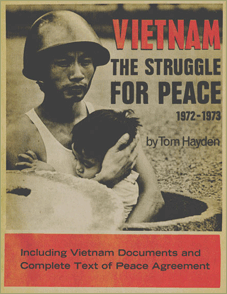Protest during the Vietnam War
The most active and effective war protest movement in American history took place during the Vietnam War. In the mid-1960s, many began to doubt the “domino theory” articulated by the Johnson administration which declared the spread of global communism a threat to the United States. Emergence of the anti-war movement alarmed many in both the government and the general public. In 1966, the House Un-American Activities Committee (HUAC) investigated citizens whom it felt were aiding the enemy.
The Democratic National Convention in Chicago in 1968 was disrupted by protests in the streets, resulting in massive arrests and brutal attacks on the protestors by the Chicago police. The subsequent trial of the infamous Chicago Seven made a public spectacle of efforts to blame and discredit those arrested; ultimately, none were convicted. Attempts were made to intimidate major newspapers and broadcast news networks from publishing or broadcasting material critical of the government, such as the Pentagon Papers (publication of which by The New York Times was upheld by the Supreme Court).
The FBI, CIA, U.S. Army, and National Security Agency established domestic intelligence programs to spy on, intimidate, and discredit leaders of the anti-war movement. The constitutionality of some programs was questioned; for example, several programs violated the Fourth Amendment, which forbids “unreasonable search and seizures.”
The voices we hear in this section include student organizations left of center, such as the Students for a Democratic Society, who focused on ending the war and defending academic freedom. As the war progressed with no end in site, some anti-war organizations splintered to form more radical factions with revolutionary aims; these are represented by the Weather Underground, the Mayday Collective, and the Youth International Party. We also hear from intensely passionate voices on the right in the publications of American Opinion, the Conservative Society of America, and ultra-conservative Orange County Representative John Schmitz.



